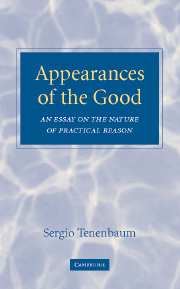Book contents
- Frontmatter
- Contents
- Acknowledgments
- Appearances of the Good
- Introduction
- 1 The Basic Framework: Desires as Appearances
- 2 The Basic Framework: From Desire to Value and Action
- 3 The Subjective Nature of Practical Reason
- 4 The Objective Nature of Practical Reason
- 5 Deontological Goods
- 6 Motivation without Evaluation? Unintelligible Ends, Animal Behavior, and Diabolical Wills
- 7 Evaluation and Motivation Part Company? The Problem of Akrasia
- 8 Evaluation without Motivation? The Problem of Accidie
- Bibliography
- Index
3 - The Subjective Nature of Practical Reason
Published online by Cambridge University Press: 25 August 2009
- Frontmatter
- Contents
- Acknowledgments
- Appearances of the Good
- Introduction
- 1 The Basic Framework: Desires as Appearances
- 2 The Basic Framework: From Desire to Value and Action
- 3 The Subjective Nature of Practical Reason
- 4 The Objective Nature of Practical Reason
- 5 Deontological Goods
- 6 Motivation without Evaluation? Unintelligible Ends, Animal Behavior, and Diabolical Wills
- 7 Evaluation and Motivation Part Company? The Problem of Akrasia
- 8 Evaluation without Motivation? The Problem of Accidie
- Bibliography
- Index
Summary
The claim that “values are subjective” can be understood in a wide variety of ways, ranging from extremely controversial to nearly trivial interpretations of the claim. Throughout this chapter, I will introduce various versions of the claim and examine what these different versions imply, as well as whether the scholastic view can make sense of the claims that seem the most intuitively plausible. Two constraints, I argue, turn out to be very plausible. The first constraint I call “object-subjectivism.” Although this constraint has fallen into some disrepute, I will argue that when properly understood, it is a quite plausible constraint. The other constraint, which I call “authority-subjectivism,” is more popular among contemporary philosophers. These two constraints seem to pull in opposite directions. On the one hand, object-subjectivism places constraints on the content of what one ought to desire or what can count as valuable; such content must be suitably related to the agent's mental states. On the other hand, authority-subjectivism makes value depend somehow on the evaluative attitudes of the agent. Something is valuable, according to the constraint, only if it is properly related to the agent's evaluative judgment or to other similar attitudes. It seems perfectly possible (and in fact true) that an agent might judge to be good (or have whatever other evaluative attitude ultimately figures in the constraint) objects other than mental state or fail to judge to be good (or fail to have) whatever other evaluative attitude ultimately figures in the constraint toward any mental state.
- Type
- Chapter
- Information
- Appearances of the GoodAn Essay on the Nature of Practical Reason, pp. 100 - 144Publisher: Cambridge University PressPrint publication year: 2007



